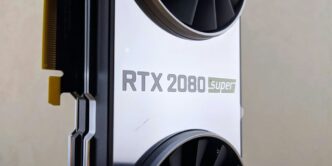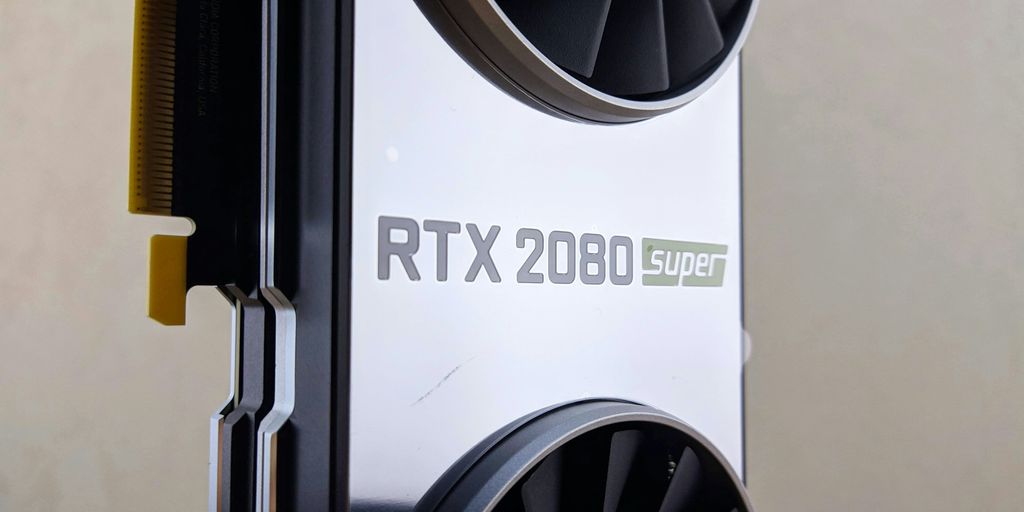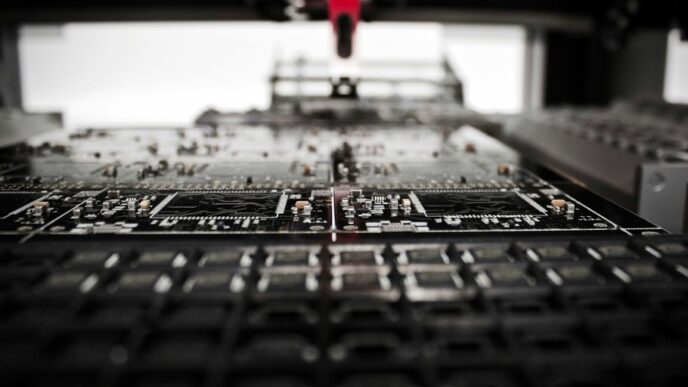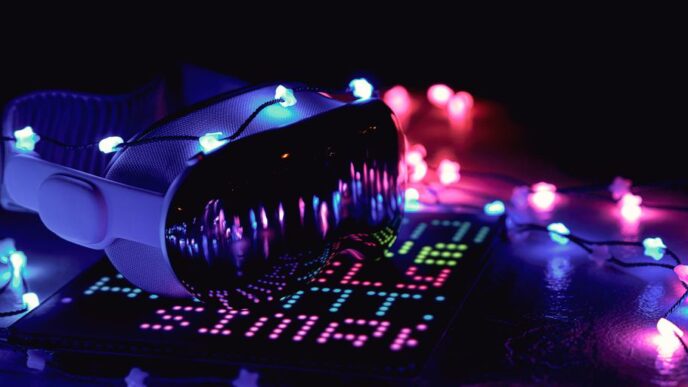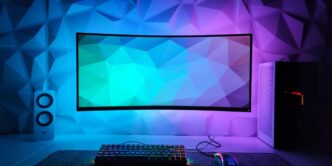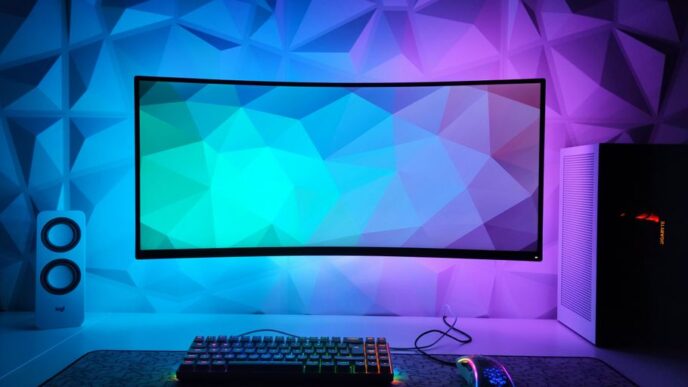So, you’re thinking about that old RX 580 for your gaming rig in 2025? It’s a fair question. This card has been around for a while, a real workhorse for many budget builds. But with new games coming out all the time and graphics getting more demanding, it makes sense to wonder if this GPU still has what it takes. We’re going to break down what you can expect from the RX 580 in the coming year, looking at its performance, how it stacks up against newer cards, and whether it’s still a smart buy for your money.
Key Takeaways
- The RX 580 can still handle 1080p gaming in 2025, but you’ll need to adjust settings for newer titles.
- It uses more power than modern graphics cards, which can mean higher electricity bills over time.
- Don’t expect ray tracing or the latest video codec support with the RX 580; it’s an older card.
- Its value is best for gamers on a tight budget who prioritize 1080p performance over cutting-edge features.
- Specific models like MLLSE, SHOWKINGS, and ZER-LON RX 580s offer budget-friendly options, but check reviews for reliability.
The RX 580 in 2025: Performance Expectations
1080p Gaming Viability for the RX 580
Can the RX 580 still cut it for 1080p gaming in 2025? That’s the big question. The answer is a bit nuanced. For older titles and games with less demanding graphics, absolutely. You’ll likely be able to hit 60fps with medium to high settings. However, for the latest AAA releases, you might have to make some serious compromises, dropping settings to low or even considering a lower resolution to maintain playable framerates. The RX 580 remains a viable option for budget-conscious gamers focused primarily on 1080p gaming.
Performance Against Modern Titles with the RX 580
Let’s get real about how the RX 580 stacks up against modern games. It’s not going to be a powerhouse, that’s for sure. Expect to tweak settings quite a bit to get acceptable performance. Games that are well-optimized or lean more towards esports titles will fare better. But those graphically intensive open-world games? That’s where the RX 580 will start to show its age. The 16GB variant might offer some future-proofing.
Here’s a rough idea of what to expect:
- Older Titles (2018 and earlier): High to Ultra settings, 60+ fps
- Mid-Range Titles (2019-2021): Medium to High settings, 45-60 fps
- Modern AAA Titles (2022+): Low to Medium settings, 30-45 fps (or lower)
Keep in mind that these are just estimates, and actual performance will vary depending on the specific game and your system configuration.
VRAM Headroom and the RX 580
VRAM is a crucial factor, especially as games become more demanding. The RX 580 typically comes with 8GB of VRAM, which was decent a few years ago, but is starting to feel a bit tight in 2025. Some newer games might push past that limit, leading to stuttering and performance issues. While 8GB of VRAM continues to provide adequate headroom for most current titles at this resolution, it’s something to keep in mind. Here’s a quick breakdown:
- 8GB VRAM: Suitable for most 1080p gaming, but may struggle with ultra settings or heavily modded games.
- Games with High Texture Detail: May require lower settings to avoid VRAM limitations.
- Future Games: VRAM requirements are only going to increase, so this is a potential bottleneck.
Comparing the RX 580 to Current Alternatives
It’s 2025, and the graphics card market has moved on quite a bit since the RX 580 was the hot new thing. So, how does it stack up against what’s available now? Let’s take a look.
RX 580 Versus Newer AMD Offerings
AMD has released several generations of cards since the RX 580. The RX 6000 and RX 7000 series offer significantly better performance, but they also come at a higher price point. The real question is whether the performance jump justifies the extra cost. For example, an RX 6600 offers a substantial performance increase over the RX 580, especially at 1440p. But if you’re only gaming at 1080p and on a tight budget, the RX 580 might still hold its own. The GPU hierarchy can help visualize these differences.
RX 580 Against NVIDIA’s Budget GPUs
NVIDIA also has some budget-friendly options that compete with the RX 580. Cards like the GTX 1650 Super and the RTX 3050 offer different trade-offs. The GTX 1650 Super is generally a bit faster than the RX 580 in some titles, while the RTX 3050 offers a more significant performance boost and also includes ray tracing capabilities. However, the RTX 3050 is also more expensive. Here’s a quick comparison:
| GPU | 1080p Performance | Ray Tracing | Price (USD) |
|---|---|---|---|
| RX 580 | 100% | No | $70-100 |
| GTX 1650 Super | 105% | No | $120-150 |
| RTX 3050 | 125% | Yes | $180-220 |
Keep in mind that these are just estimates, and actual performance can vary depending on the game and system configuration.
Value Proposition of the RX 580 in a Competitive Market
The RX 580’s main advantage in 2025 is its price. You can find used RX 580s for very cheap, making them an attractive option for budget-conscious gamers. However, you need to consider the trade-offs. Newer cards offer better performance, more features (like ray tracing), and better power efficiency. Here are some things to consider:
- Budget: How much are you willing to spend?
- Resolution: What resolution do you plan to game at?
- Features: Do you care about ray tracing or other advanced features?
- Longevity: How long do you expect to use the card?
If you’re on a very tight budget and only need a card for 1080p gaming, the RX 580 can still be a decent option. But if you can afford to spend a bit more, you’ll get a much better experience with a newer card. It really comes down to balancing cost and performance.
Power Consumption and Efficiency of the RX 580

Understanding the RX 580’s Power Draw
The RX 580, built on the Polaris architecture, isn’t exactly known for sipping power. It’s more like it enjoys a hearty gulp. The card typically draws around 185W TDP (Thermal Design Power), and in real-world gaming scenarios, you can expect it to hover around 180-190W under full load. This is noticeably higher than some of the newer, more efficient cards that offer similar performance. The older 14nm manufacturing process is a key reason for this. Idle power consumption is also something to consider, sitting around 15W, which is a bit higher than modern GPUs. Let’s be real, it’s not the most eco-friendly option out there, but it gets the job done. For example, the RTX 5090 is significantly more efficient.
Recommended Power Supply Units for the RX 580
Choosing the right PSU is important to keep your system running smoothly and avoid any unexpected shutdowns or damage. Here’s a quick guide:
- For systems with mid-range CPUs (like a Ryzen 5 or Core i5), a minimum 500W PSU is recommended.
- If you’re rocking a high-end CPU or plan on doing any overclocking, bump that up to 600W or higher.
- Aim for at least a Bronze efficiency rating, but Gold is preferable for better energy efficiency and potentially lower electricity bills.
- Make sure your PSU has at least one 8-pin PCIe power connector to properly power the RX 580.
Don’t skimp on the PSU; it’s the heart of your system. A reliable PSU ensures stable power delivery and protects your components.
Long-Term Electricity Costs with the RX 580
Okay, let’s talk about the elephant in the room: electricity bills. The RX 580’s higher power consumption can add up over time, especially if you’re a heavy gamer or use your PC for extended periods daily. While the difference might not be huge for casual gamers, those who spend many hours gaming might notice a difference compared to more efficient cards. Here’s a simplified example:
Let’s say you game for 4 hours a day, and your electricity costs $0.15 per kWh. A more efficient card might use 50W less on average. Over a year, that’s a noticeable difference. It’s something to keep in mind if you’re trying to save money on your electricity bills in the long run.
Features and Limitations of the RX 580
Absence of Ray Tracing Support on the RX 580
Let’s be real, the RX 580 came out before ray tracing was even a thing for most gamers. It simply doesn’t have the hardware to support it. If you’re looking for fancy lighting effects, you’ll need to consider a newer card. This is a pretty big limitation in 2025, as more and more games are starting to implement ray tracing, even if it’s just in a limited capacity. It’s a feature you’ll definitely miss out on.
The RX 580 and Modern Codec Support
The RX 580 does alright with video codecs, but it’s showing its age. It handles H.264 just fine, and it can even decode H.265 (HEVC), which is pretty common these days. However, it struggles with AV1, the newer codec that’s becoming more popular for streaming and video playback. This means you might see higher CPU usage when watching AV1 videos, or you might not be able to play them smoothly at all. If you’re big on streaming or watching high-resolution video, this is something to keep in mind. The RX 580 8GB graphics card is not the best option for modern codecs.
Future-Proofing Concerns for the RX 580
Okay, let’s talk about the elephant in the room: future-proofing. The RX 580 was a great card in its day, but it’s getting old. While it can still handle many games at 1080p, it’s not going to be a powerhouse for much longer. Here are a few things to consider:
- Driver support: AMD will likely continue to provide drivers for the RX 580 for a while, but they’ll eventually shift their focus to newer cards.
- Game requirements: Games are only going to get more demanding, and the RX 580 might not be able to keep up with the latest titles, even at lower settings.
- VRAM limitations: While 8GB of VRAM was plenty a few years ago, some newer games are starting to push those limits, especially with high-resolution textures. The MLLSE RX 580 has 8GB of VRAM, which is good, but not great.
Basically, if you’re planning on building a new gaming PC in 2025, the RX 580 might not be the best choice if you want it to last for several years. You might be better off spending a bit more on a newer card that will give you more headroom for future games.
Pricing and Value of the RX 580 in 2025

Current Market Price for the RX 580
Alright, let’s talk money. As of July 2025, you can usually find an RX 580 floating around the used market. New ones are pretty much gone. Expect to pay anywhere from $75 to $120, depending on the condition and who’s selling it. Keep an eye out for deals, but also be wary of anything that seems too good to be true – you don’t want a card that’s been mining crypto 24/7 for the last few years. The current market price really dictates whether it’s a good buy or not.
Performance Per Dollar for the RX 580
Okay, so how much bang do you get for your buck? For 1080p gaming on a budget, the RX 580 still holds its own. You can play a lot of games at medium to high settings without breaking the bank. But let’s be real, it’s not a powerhouse. If you’re aiming for high refresh rates or want to crank up the settings on newer titles, you might be disappointed. Here’s a quick comparison:
| Game | Settings | FPS (Approx.) |
|---|---|---|
| Fortnite | Medium | 90-110 |
| Cyberpunk 2077 | Low | 30-40 |
| GTA V | High | 60-75 |
As you can see, it varies a lot. For older games or less demanding titles, it’s a solid choice. But for the latest AAA games, you’ll have to make some compromises. It’s all about that performance per dollar.
When the RX 580 Offers Good Value
So, when does it actually make sense to buy an RX 580 in 2025? Here are a few scenarios:
- You’re building a budget gaming PC and absolutely can’t spend more than $100 on a graphics card.
- You primarily play older games or esports titles that don’t require a ton of graphical horsepower.
- You’re upgrading from an even older card (like a GTX 750 Ti or an R7 360) and want a noticeable boost without spending a fortune.
- You find a really good deal on a used RX 580 from a reputable seller.
If any of those apply to you, then the RX 580 might still be a decent option. But if you can stretch your budget a bit, you’ll probably be happier with a newer card that offers better performance and features. Think about the RX 580’s value before you buy.
Specific RX 580 Models and Their Viability
MLLSE RX 580: A Budget Option
So, you’re looking at the MLLSE RX 580, huh? It’s definitely a budget card, and in 2025, that means managing expectations. The MLLSE RX 580 is a decent option for those building a PC on a shoestring budget, especially if you’re okay with 1080p gaming at medium settings. It’s not going to blow anyone away, but it’ll get the job done for less demanding titles. Just be aware of its limitations. Here’s a quick rundown:
- It consumes more power than newer cards. Expect around 190W under load. You’ll want at least a 500W PSU, maybe 600W if you’ve got a beefier CPU.
- The cooler isn’t the best. It can run a little hot, so make sure your case has good airflow. Overclocking? Maybe not the best idea unless you’re comfortable with higher temps.
- Don’t expect a ton of support. It’s a budget card from a smaller brand, so warranty and customer service might not be top-notch.
Here’s a comparison with some other cards to give you an idea of where it stands:
| GPU | 1080p Gaming Performance | Power Efficiency | Current Price Range |
|---|---|---|---|
| MLLSE RX 580 (8GB) | 100% (baseline) | 100% (baseline) | $120-150 |
| Original AMD RX 480 (8GB) | 92% | 105% | $100-130 (used) |
| Original AMD RX 570 (4GB) | 85% | 90% | $80-110 (used) |
SHOWKINGS RX 580: Compact Gaming
If you’re building a smaller PC, the SHOWKINGS RX 580 might be worth a look. These cards are often designed to be more compact, which is great for Mini-ITX builds. However, that compact design can come with some trade-offs. The cooling solution might not be as robust as on a full-sized card, so keep an eye on temperatures. Also, sometimes these smaller cards have slightly lower clock speeds to manage thermals. Here’s what to consider:
- Form Factor: Obviously, the main draw is the smaller size. Make sure it actually fits your case!
- Cooling: Check reviews to see how well it handles heat. A smaller cooler might mean higher fan speeds and more noise.
- Power: It’ll still draw a decent amount of power, so make sure your PSU is up to the task. A reliable PSU is a must.
ZER-LON RX 580: Price and Performance
The ZER-LON RX 580 is all about finding that sweet spot between cost and what you get for your money. These cards often aim to be the most affordable option, but that can mean cutting corners in certain areas. You might see a simpler cooler design, fewer features, or slightly lower clock speeds compared to more premium RX 580 models. Here’s what to keep in mind:
- Price: This is the big one. Is it significantly cheaper than other RX 580s? If not, it might not be worth it.
- Build Quality: Check reviews to see if there are any common complaints about the build quality or reliability. A super cheap card might not last as long.
- Warranty: What kind of warranty does it come with? A longer warranty can give you some peace of mind.
Beyond Gaming: RX 580 for Other Workloads
While the RX 580 is primarily known as a gaming card, it can still handle other tasks in 2025. It’s not going to be a powerhouse for professional workloads, but it can be useful in certain situations.
The RX 580 for Content Creation
The RX 580 can handle some entry-level content creation, like video editing and photo editing. Don’t expect to edit 4K footage smoothly, but for 1080p projects, it’s usable. It’s also suitable for multi-monitor setups, which can boost productivity. However, professional content creators will likely want something more powerful.
AI and Machine Learning with the RX 580
Let’s be real, the RX 580 isn’t ideal for AI or machine learning. It lacks the specialized hardware (like Tensor Cores on NVIDIA cards) that accelerates these workloads. You can technically run some basic AI tasks, but it will be slow. For serious AI work, you’ll want a more modern GPU. Here are some reasons why it’s not recommended:
- Limited VRAM compared to modern AI-focused cards.
- Lack of dedicated AI acceleration hardware.
- Older architecture not optimized for current AI frameworks.
Virtual Reality Performance on the RX 580
VR is a mixed bag on the RX 580. It technically meets the minimum requirements for some VR games, but the experience might not be great. Expect to turn down settings and potentially encounter frame rate issues. For a truly enjoyable VR experience, a more powerful card is recommended. The RX 580 is adequate for casual streaming using CPU encoding, but it’s not ideal for demanding VR titles. Here’s a quick summary:
- Barely meets minimum VR requirements.
- Expect to lower graphics settings.
- May experience frame rate drops in demanding games.
So, Is the RX 580 Still Good in 2025?
Alright, so after looking at everything, the RX 580 in 2025 is kind of a mixed bag. If you’re really watching your money and just want to play games at 1080p, it can still get the job done. You’ll probably have to turn down some settings on newer games, but it’ll play them. The 8GB of memory helps a lot with that. But, if you can spend just a little more, like another $70 to $100, you’re way better off getting something newer. Cards like the RX 6600 or RTX 3050 give you a lot more power, use less electricity, and have features that the RX 580 just doesn’t. So, for a super tight budget, sure, it’s an option. For anything else, you might want to pass.
Frequently Asked Questions
Can the RX 580 still handle games in 2025?
The RX 580 can still play games at 1080p resolution in 2025, especially if you turn down some of the graphics settings. It’s not for the newest, most demanding games at their highest settings, but it can handle many popular titles.
What kind of power supply do I need for the RX 580?
The RX 580 uses more power than newer graphics cards. You’ll likely need a power supply unit (PSU) of at least 500 watts, and probably 600 watts or more if you have a powerful computer or plan to make your card run faster.
Does the RX 580 support ray tracing?
No, the RX 580 does not have ray tracing. Ray tracing is a newer graphics technology that makes lighting in games look more real, but it needs special hardware that the RX 580 doesn’t have.
Is the RX 580 good for things other than gaming, like video editing?
The RX 580 is not the best choice for professional content creation or heavy AI tasks. It can do some basic video editing or photo work, but it lacks the special features and speed of newer cards for these kinds of jobs.
How much longer will the RX 580 be good for gaming?
For 1080p gaming at medium to high settings, the RX 580 should be good for another year or two. As games get more advanced, you might need to lower settings even more or think about getting a newer card for the very latest games.
Can the RX 580 handle virtual reality (VR)?
The RX 580 can run virtual reality (VR) games, but it’s on the low end of what’s recommended. You’ll probably need to use lower quality settings in VR games to get them to run smoothly.

